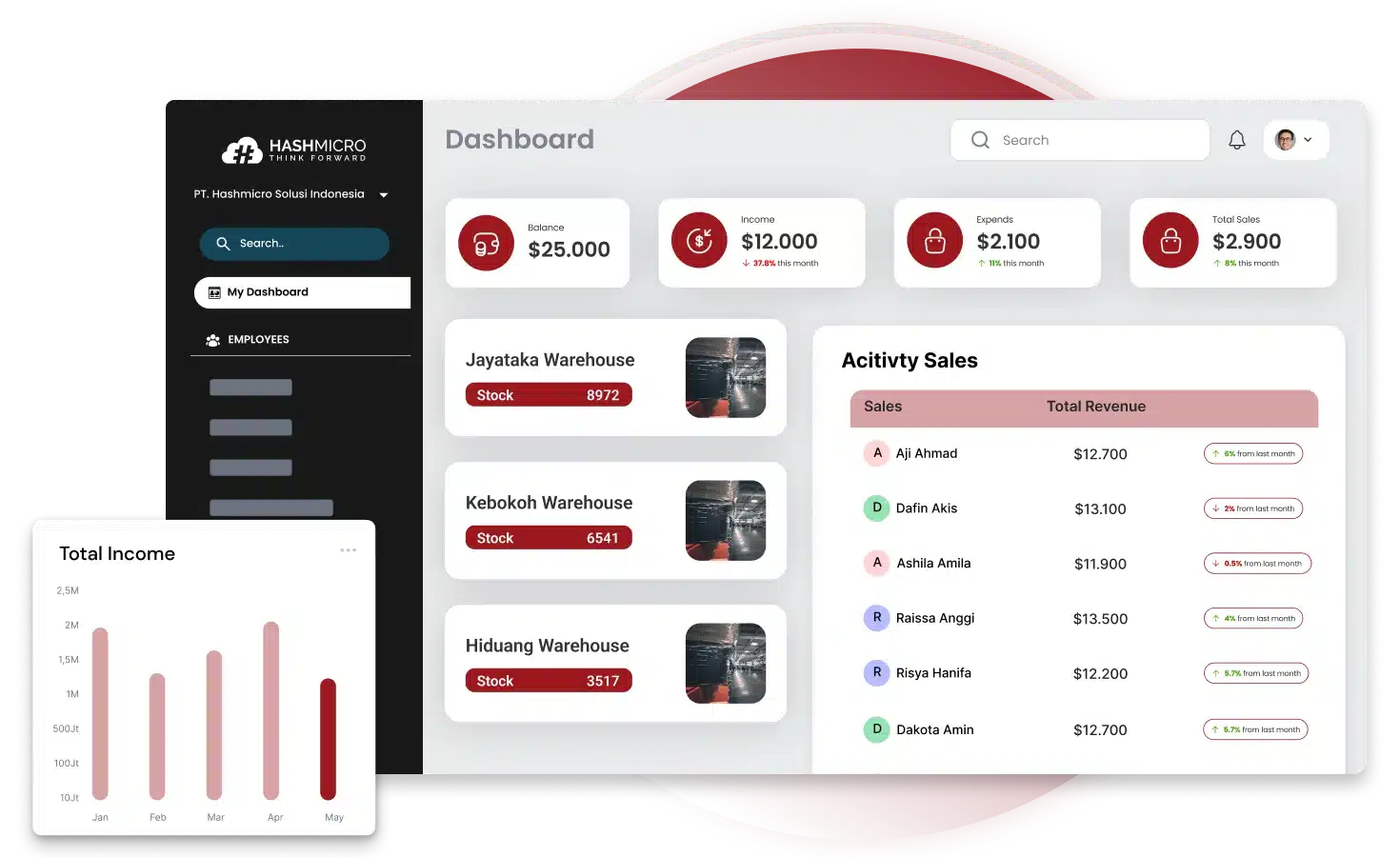When I first started managing social media for a growing business, I realized how hard it was to connect real engagement with actual results. Likes and followers looked great, but I couldn’t clearly see how they impacted sales until I learned about ERP Software.
By connecting social media activities with ERP data, every campaign suddenly had purpose. I could see which posts drove real leads, which audiences converted, and how online engagement shaped business growth.
In this article, we’ll explore how integrating ERP systems with social media strategies can turn your online presence into a powerful, data-driven engine for business success.
Key Takeaways
|
ERP and Its Connection with the Management of Social Media
 Integrating social media platforms like Facebook, Instagram, Twitter, and LinkedIn with an ERP system can greatly enhance how businesses operate and engage with customers. This combination not only strengthens marketing efforts but also improves collaboration.
Integrating social media platforms like Facebook, Instagram, Twitter, and LinkedIn with an ERP system can greatly enhance how businesses operate and engage with customers. This combination not only strengthens marketing efforts but also improves collaboration.
Here’s how businesses can benefit from aligning ERP systems with social media:
- Centralized customer insights: ERP systems allow businesses to collect and store valuable customer data — from preferences and behaviors to feedback.
- Better team collaboration: Social media tools encourage communication and collaboration across departments. When connected to an ERP system, employees can access shared data and updates in real time.
- Improved customer support: With integration, businesses can track customer interactions and manage inquiries efficiently. Real-time data from both ERP and social media ensures that issues are resolved promptly.
- More innovative marketing strategies: Combining ERP data with social media analytics enables more precise targeting, including a giveaway-based promotional strategy to increase engagement.
- Enhanced sales and performance tracking: ERP systems track inventory and sales in real time, while social media integration adds insights into campaign performance.
In short, merging ERP systems with social media provides a unified view of customer behavior, strengthens internal communication, and helps businesses make smarter, data-driven decisions.
Key Benefits of Integrating ERP with Social Media
1. Centralization of Information for Specific Intervention
Stated below are some of the advantages of implementing an ERP system in relation to social media; One of the greatest advantages is the fact that data is consolidated. ERP systems collect information from different points of contact and are a centralized information repository.
It is also centralized and helps in the evaluation of customer behaviors, preferences, and interactions via various social platforms. For instance, by analyzing regularity from other sites that individuals visit and download TikTok videos, organizations can design their promotions in tune with relevant audiences.
2. Occasional Customer Engagement as a Result of On-Schedule Interactions
This is because the ERP systems have features for creating compact schedules for the posts that are to be done, the content calendar, and the ability to deal with inquiries from customers as they are swift.
Such timely interaction is important to create a feeling of togetherness (the community feeling) hence serving the loyalty base which is pertinent to brand development on social media platforms.
Programs like the SSSTIK can be easily fitted into ERP to optimize content delivery and engagement strategies where each touchpoint matters.
3. Personalization at Scale
There is hardly anything better in promoting appeals than personalized advertising. ERP systems add personalization by analyzing customer statistics to divide its target audience and distribute marketing messages.
This strategy helps to achieve the goals set by organizations as the content shared on social media platforms will be what the audience wants to see. Personalized campaigns can start from simple ads or go as far as email marketing.
4. Higher ROI in Social Media Campaigns
When social media is integrated with ERP, an organization can, therefore, determine the return on investment of any social media marketing campaign. The system logs all the conversations and business from social media outreach and the outcomes.
This information is particularly useful in adjusting marketing methodologies and budget distribution to allow the business to optimize its social media budgetary spending.
5. Automating Routine Tasks to Increase Efficiency
Currently, the ERP system controls processes like posting, schedules, customer notifications, and report generation. This automation helps social media managers save a lot of time for creative work, which may include content creation and community management.
6. True-Time Solutions for Real-Time Decisions
Because social media is constantly evolving, businesses need to be more adaptive. Enterprise resource planning systems give real-time data on the industry, customers’ attitudes, and campaigns.
Such easy access to information makes it easy for businesses to make necessary decisions quickly, adopt new strategies or new markets that they identify after some point in time, and take advantage of other opportunities in the market.
Here is a table summary of the key benefits of integrating ERP with social media
| Key Benefits | Description |
| Centralization of Information for Specific Intervention | ERP systems unify data from all platforms, helping businesses analyze customer behavior and create more focused social media campaigns. |
| Occasional Customer Engagement as a Result of On-Schedule Interactions | Automated scheduling and quick response tools ensure regular interactions, boosting community engagement and brand loyalty. |
| Personalization at Scale | By segmenting audiences through data insights, ERP systems enable personalized, high-impact marketing across all social channels. |
| Higher ROI in Social Media Campaigns | Integrating ERP with social media helps track campaign performance and ROI. Businesses can analyze data from interactions and outcomes to adjust marketing strategies and optimize budget allocation. |
| Automating Routine Tasks to Increase Efficiency | ERP automates repetitive tasks like post scheduling, notifications, and report generation. This allows social media teams to focus more on creative strategy and audience engagement. |
| True-Time Solutions for Real-Time Decisions | ERP provides real-time data on customer behavior and campaign performance, helping businesses make faster, data-driven decisions and quickly adapt to market changes. |
Improve Your Social Media Operations with HashMicro’s ERP Software
 HashMicro’s ERP Software helps streamline your social media operations through automation, centralized data, and AI-driven insights, allowing your team to manage campaigns more efficiently and effectively.
HashMicro’s ERP Software helps streamline your social media operations through automation, centralized data, and AI-driven insights, allowing your team to manage campaigns more efficiently and effectively.
With its integrated system, your business can connect social media data with sales, customer service, and marketing modules, providing a complete view of performance across platforms.
Here are some key features that make HashMicro the ideal solution for managing social media operations:
- Centralized Customer Data: Consolidate insights from multiple social platforms to understand audience behavior and improve targeting.
- Automated Scheduling & Posting: Plan and publish content automatically across platforms while maintaining brand consistency.
- Real-Time Analytics & Reporting: Monitor engagement metrics and campaign performance instantly to optimize strategies.
- Collaboration Dashboard: Enable marketing and sales teams to work together seamlessly with a unified communication hub.
- Campaign ROI Tracking: Measure the direct impact of each social campaign on leads, sales, and customer retention.
Conclusion
ERP solutions, when linked with social media marketing techniques, have numerous advantages that can significantly help a business expand its audience penetration across various social media platforms.
Through the integration of ERP and social media, HashMicro’s ERP Software offers a comprehensive ERP solution with complete features and benefits to maximize social media marketing.
Therefore, choosing an ERP system that can integrate with various social media and streamlining the marketing process is important. If you’re curious about the HashMicro ERP system, do not miss the chance to try the free demo now!

Frequently Asked Questions
-
How can ERP software support social media growth?
ERP software centralizes customer and sales data, allowing businesses to track audience behavior and engagement. This helps create more targeted social media campaigns that drive higher reach and conversions.
-
Can ERP integrate directly with social media platforms?
Yes. Many ERP systems can integrate with platforms like Facebook, Instagram, and LinkedIn to automatically sync customer feedback, sales data, and campaign performance for better analysis and strategy.
-
What are the main benefits of combining ERP with social media marketing?
Integrating ERP with social media helps businesses improve campaign accuracy, measure ROI, and strengthen customer relationships through personalized engagement and real-time insights.































